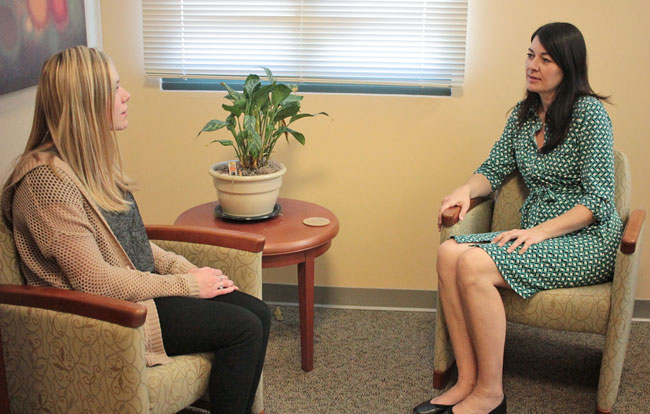How to know your child needs Individual Therapy For Teens
Wiki Article
Discovering the Benefits of Mental Therapy for Teen Health and Development
Mental therapy plays an essential role in the well-being and growth of teens. Teenage years is a turbulent period marked by emotional and social difficulties. Treatment supplies an organized environment for teens to articulate their feelings and confront their struggles. It furnishes them with important tools for durability and communication. As they navigate this developmental stage, the effect of therapy can be profound. What particular benefits can emerge from such support during these developmental years?
Recognizing the Adolescent Mind: Challenges and Pressures
As adolescents navigate the complexities of their developmental phase, they face numerous challenges and pressures that can substantially impact their psychological health and wellness. This period is marked by significant physical, psychological, and social adjustments, which can generate sensations of complication and unpredictability. Peer impact magnifies, typically resulting in a struggle for acceptance and identification. Academic assumptions can produce extra tension, as the stress to succeed installs in a progressively competitive environment.The arrival of social media presents a brand-new layer of complexity, where comparisons to curated online characters can worsen feelings of insufficiency and stress and anxiety. These elements can bring about psychological distress, including anxiety, depression, and reduced self-confidence. Understanding these obstacles is necessary for parents, instructors, and psychological health professionals, as it gives insight right into the adolescent experience and highlights the demand for helpful treatments to cultivate durability and health during this critical developing phase.
Producing a Safe Room for Expression
Producing a secure room for expression is vital for teens navigating their turbulent developmental phase. In healing settings, this atmosphere fosters open discussion, allowing teens to connect their sensations without worry of judgment. Such areas allow them to explore their ideas and emotions, which is vital for recognizing their identities and experiences.When teenagers really feel secure, they are much more most likely to share their struggles, including stress and anxiety, clinical depression, or interpersonal conflicts. This open communication can cause much deeper understandings and promote personal growth.
Additionally, a secure room encourages creativity and self-reflection, providing young adults the freedom to reveal themselves with numerous electrical outlets, such as art or writing. Developing trust between the specialist and the teen is vital, as it underpins the performance of the healing procedure. Inevitably, developing a risk-free room for expression serves as a structure for psychological healing and individual growth during these formative years.
Developing Coping Strategies and Resilience

Specialists commonly present methods such as mindfulness, journaling, and analytical skills, making it possible for teens to manage their responses better. Furthermore, by involving in role-play scenarios, they practice how to deal with hard circumstances, strengthening their self-confidence. Over time, these skills promote a feeling of agency, furnishing teens with the tools to browse life's uncertainties. The advancement of durability not only help in conquering immediate obstacles yet also lays the groundwork for healthier psychological reactions in their adult years, ultimately adding to lifelong well-being.
Enhancing Communication Abilities
Efficient communication abilities are vital for teens as they browse intricate social landscapes. Psychological therapy plays an important role in improving these abilities, allowing teenagers to share their ideas and feelings much more plainly. Through directed sessions, therapists encourage teens to express their feelings, helping with much better understanding in peer communications and family members characteristics.Moreover, treatment supplies a safe room for practicing energetic listening, empathy, and assertiveness. These abilities empower young adults to engage in meaningful discussions, resolve disputes, and develop more powerful relationships. As they learn to interact properly, they likewise obtain self-confidence in their capability to advocate for themselves and their demands.
In addition, boosted interaction abilities add to emotional intelligence, permitting teenagers to respond and site here identify to the emotions of others. This holistic advancement cultivates an encouraging setting, eventually promoting overall wellness and social combination. With psychological treatment, teens can cultivate these essential abilities for a much healthier social experience.
Cultivating Personal Development and Self-Discovery
Promoting personal development and self-discovery in young adults involves a multifaceted method that encourages understanding of individuality. This procedure also emphasizes the relevance of structure resilience skills and improving psychological recognition. With each other, these aspects create a structure for much healthier, much more confident people as they navigate their formative years.Comprehending Individuality
Just how do teens navigate the facility landscape of personal identity as they seek for self-discovery and growth? During this developmental period, they face different influences, consisting of peers, family, and societal assumptions. Psychological therapy can offer as a necessary tool, providing a risk-free space for expedition and reflection. Through led conversations, young adults can verbalize their ideas and feelings, enabling them to understand their beliefs, needs, and values. This process promotes a much deeper understanding of their one-of-a-kind identity, encouraging them to make informed options and develop a sense of objective. As they engage in self-discovery, they discover to accept their originality and navigate difficulties with better clarity, inevitably enhancing their general wellness and individual growth.Building Strength Abilities

Enhancing Emotional Awareness
Enhancing emotional recognition is critical for teens steering the intricacies of teenage years, as it permits them to recognize and understand their sensations a lot more successfully. By taking part in mental treatment, teenagers discover to identify their psychological actions and the triggers behind them. This process cultivates individual growth and self-discovery, allowing them to verbalize their emotions and deal with difficulties much more adeptly. As teenagers establish emotional recognition, they cultivate empathy, enhance connections, and enhance interaction skills. In addition, this heightened awareness help in decision-making, assisting them browse social stress and develop a feeling of identity. Eventually, fostering psychological awareness with treatment can lead to much healthier coping mechanisms and an extra balanced emotion, fundamental for prospering during these developmental years.Structure Healthy Relationships and Assistance Solutions
While going across the intricacies of adolescence, developing healthy and balanced connections and assistance systems is vital for young adults. These connections give emotional stability and a feeling of belonging, crucial throughout this developing stage. Favorable partnerships with peers, family, and coaches can boost self-esteem and durability, making it possible for young adults to navigate difficulties extra effectively.Mental treatment plays a crucial role in promoting these connections by outfitting adolescents with communication and conflict-resolution skills. With therapy, they learn to reveal their sensations, understand different point of views, and develop limits, which are basic for keeping healthy interactions.
Furthermore, helpful networks motivate teens to look for aid when required, lowering seclusion and advertising mental health. They are a lot more most over here likely to engage in constructive behaviors and make informed decisions when adolescents really feel linked to their support systems (Individual Therapy Toronto). Generally, the growing of image source healthy relationships and assistance systems contributes in promoting adolescent wellness and personal growth
Often Asked Questions
Just how Do I Discover a Qualified Specialist for My Teen?
To discover a qualified specialist for a teenager, one must seek suggestions from healthcare providers, research study qualifications on the internet, examine evaluations, and establish the therapist focuses on teenage problems, fostering a helpful atmosphere for development.What Are the Expenses Connected With Mental Therapy for Teens?
The prices related to psychological treatment for teens vary commonly, typically ranging from $50 to $250 per session. Insurance policy insurance coverage, sliding scale costs, and neighborhood sources can influence price and availability for families looking for assistance.
How Usually Should Teenagers Attend Treatment Procedure?
Teens ought to preferably attend treatment sessions once a week or biweekly, depending upon specific demands. Consistent sessions can cultivate a secure area for expression, while enabling therapists to keep track of progress and readjust approaches successfully gradually.Can Therapy Be Effective for All Teenagers?
Treatment can be efficient for many teenagers, but individual outcomes vary. Factors such as individual scenarios, openness to the process, and the healing technique employed all affect its performance for each teen.What Should Parents Do During Their Teenager's Treatment Refine?
Parents ought to actively sustain their teen's therapy procedure by preserving open interaction, appreciating confidentiality, going to sessions if invited, and encouraging their child's initiatives (Individual Counselling Toronto). Understanding and patience are essential as teens navigate their personal development journeyPsychological treatment plays an essential role in the well-being and development of teens. By engaging in psychological therapy, adolescents find out to acknowledge their emotional feedbacks and the triggers behind them. Mental therapy plays an essential function in fostering these partnerships by gearing up adolescents with interaction and conflict-resolution skills. Young adults must ideally go to therapy sessions once a week or biweekly, depending on specific needs. Moms and dads should actively sustain their teen's treatment process by keeping open communication, valuing privacy, participating in sessions if invited, and motivating their kid's initiatives.
Report this wiki page